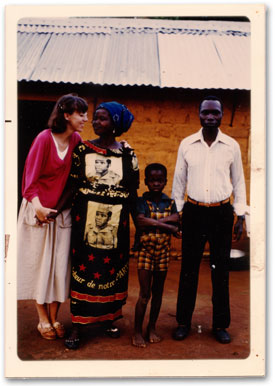Column: Practical Ideals and the Peace Corps
Fifty years ago this week, I was a few days away from ending nine months of gestation in my mother’s belly – which is to say, on Oct. 14, 1960 I wasn’t among the throngs gathered in front of the Michigan Union at 2 a.m., enduring fatigue and drizzling rain to hear John F. Kennedy give a campaign stump speech.

A photo taken in 1985 with the Moudyoutenday family at the start of my Peace Corps experience in the Central African Republic. I'm the one looking the least dignified.
But 25 years later, my life was tightly intertwined with that speech, though I didn’t know it at the time. In October of 1985 I was a Peace Corps volunteer, fumbling my way through the first few weeks of life in a mud hut, learning to accept rats and roaches as daily encounters, realizing how much I missed American toilets – teaching English, of all things, to youngsters in the impoverished Central African Republic.
It was a transformative two years for me – but not in the way that recent hagiographic celebrations of the Peace Corps’ 50th anniversary might have you believe. In fact, I emerged from the experience with ambiguous feelings toward the Corps, and specifically toward the mythos that’s arisen around it.
I was struck by that ambiguity again on Thursday morning, as I listened to speakers on the steps of the Michigan Union describe with such certitude the pivotal role that the Peace Corps plays in fostering world peace. It gets to the crux of my discomfort with this message: While I believe wholeheartedly that the program benefits the mostly single, middle-class, recent college grads who make up its ranks, I’m much less convinced of its lasting positive impact on the countries where volunteers serve. [Full Story]



